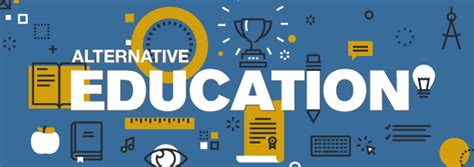Are you tired of the traditional college experience and looking for something different? In this blog post, we will explore the various alternative education programs offered at universities across the United States. From experiential learning and online education to interdisciplinary and community engagement programs, there are a plethora of innovative approaches to higher education available. We will delve into the diverse options for students who are looking for more flexibility, autonomy, and real-world experience. Whether you are interested in entrepreneurship, social issues, or global citizenship, there are programs designed to cultivate and nurture your unique interests and skills. Join us as we discover the exciting and transformative opportunities for forging new paths in education.
Table of Contents
Recognizing the Need for Alternative Education Programs
Recognizing the need for alternative education programs is crucial in addressing the diverse learning needs of students. Traditional education systems may not always cater to the unique learning styles and abilities of every individual. Alternative education programs offer a variety of options that can better support students who may thrive in non-traditional settings.
Exploring the diversity of alternative education options is essential to understanding the different approaches that can be taken to meet the needs of students. From experiential learning programs to online education, there are a wide range of alternatives that can provide flexibility and access to education for students of all backgrounds.
It’s important to acknowledge the innovative approaches that alternative education programs offer. These programs often focus on interdisciplinary learning, community engagement, and self-directed learning, providing students with a comprehensive and customized educational experience.
The recognition of the need for alternative education programs is an important step in creating a more inclusive and effective education system. By acknowledging the diverse learning needs of students, we can work towards harnessing the full potential of every individual and creating a more equitable education system.
Exploring the Diversity of Alternative Education Options
When it comes to education, it’s important to recognize that there is no one-size-fits-all approach. Every student has unique learning styles, interests, and needs, and it’s essential to offer a diverse range of alternative education options to accommodate these differences.
One alternative education option that has been gaining traction in recent years is experiential learning programs. These programs focus on hands-on, real-world experiences that allow students to apply their knowledge in practical settings. Whether it’s through internships, apprenticeships, or service learning projects, experiential learning programs provide students with valuable opportunities to develop essential skills and gain insight into potential career paths.
Online education is another alternative that has become increasingly popular, offering students flexibility and access to a wide range of courses and resources. Whether it’s through fully online programs or blended learning models, online education allows students to learn at their own pace and from virtually anywhere, making it a powerful alternative for those who may not thrive in traditional classroom settings.
It’s also important to consider interdisciplinary programs as an alternative education option. These programs break the mold of traditional subject-specific education by integrating multiple disciplines and creating connections between different areas of study. By doing so, interdisciplinary programs promote critical thinking and problem-solving skills, preparing students to tackle complex real-world challenges.
Innovative Approaches: Experiential Learning Programs
Experiential learning programs offer students with hands-on, real-world experiences that often take place outside of the traditional classroom setting.
These innovative approaches provide students with the opportunity to apply their knowledge and skills in practical situations, allowing them to gain a deeper understanding of the subject matter.
Whether it’s through internships, co-op programs, or service learning opportunities, experiential learning programs bridge the gap between academic learning and real-world application.
By engaging in these types of programs, students are able to develop critical thinking, problem-solving, and teamwork skills that are highly valued in the workforce.
The Power of Online Education: Flexibility and Access
Online education has revolutionized the way we learn, providing greater flexibility and access to educational opportunities. With online courses, students are no longer confined to traditional classroom settings and rigid schedules. They have the freedom to learn at their own pace, in their own time, and from virtually anywhere in the world.
One of the most significant benefits of online education is the unparalleled flexibility it offers. Whether it’s juggling work, family, or other commitments, online students have the ability to fit their learning around their existing responsibilities. This level of flexibility is particularly valuable for non-traditional students, such as adult learners, who may not have the luxury of attending a physical campus full-time.
Moreover, online education provides unparalleled access to a diverse range of courses and programs. Students are no longer limited by geographical constraints and can access high-quality education from renowned institutions worldwide. This opens up a world of opportunities for individuals who may not have had access to the same level of education otherwise.
Overall, the flexibility and access that online education offers have transformed the landscape of learning, making education more inclusive and attainable for a wider range of learners.
Breaking the Norm: Interdisciplinary Programs
Interdisciplinary programs are shaking up the traditional education model, offering students the opportunity to explore diverse fields of study and make unexpected connections. By combining multiple disciplines, such as science, technology, engineering, arts, and mathematics, these programs encourage collaboration and innovation.
One of the key benefits of interdisciplinary programs is the ability to address complex societal challenges by taking a holistic approach. Students are able to think critically and creatively, drawing on insights from different fields to develop innovative solutions to real-world problems.
Furthermore, interdisciplinary programs foster a sense of open-mindedness and curiosity, as students are exposed to a wide range of perspectives and methodologies. This can lead to greater flexibility and adaptability in the face of an ever-changing job market, as graduates are equipped with a diverse skill set and the ability to approach challenges from multiple angles.
Overall, breaking the norm with interdisciplinary programs is not only reshaping the educational landscape, but also preparing students for the complexities of the modern world.
Cultivating Entrepreneurship: Incubator Programs
Entrepreneurship is a key driver of economic growth and innovation, and business incubator programs play a crucial role in cultivating the next generation of successful entrepreneurs. These programs provide mentorship, resources, and support to budding entrepreneurs, helping them to develop their ideas and turn them into viable businesses.
Business incubators typically offer a range of services, including access to funding, workspace, networking opportunities, and expert guidance. By nurturing startups in their early stages, these programs help to reduce the risk of failure and increase the chances of long-term success for emerging businesses.
One of the key benefits of incubator programs is the opportunity for entrepreneurs to collaborate and learn from each other. This sense of community and shared learning can be invaluable for individuals who are venturing into the world of business for the first time. Moreover, many incubators also provide access to alumni networks, allowing entrepreneurs to tap into a pool of industry expertise and experience.
Overall, incubator programs are essential in fostering a culture of entrepreneurship and innovation. By providing the necessary resources and support, these programs help to empower aspiring entrepreneurs, drive economic growth, and create a more dynamic and resilient business environment.
Addressing Social Issues: Community Engagement Programs
Community engagement programs play a crucial role in addressing social issues within local neighborhoods and communities. These programs aim to bring together individuals and organizations to identify and tackle pressing social problems, such as poverty, homelessness, and access to healthcare. By promoting collaboration and partnership, community engagement programs empower individuals to actively participate in finding sustainable solutions to these complex issues.
One of the key benefits of community engagement programs is the emphasis on inclusive decision-making and the involvement of those directly affected by the social issues. This grassroots approach ensures that the solutions are culturally sensitive and tailored to the specific needs of the community. When individuals and groups are actively engaged in the planning and implementation of initiatives, they are more likely to take ownership and responsibility for the outcomes, leading to lasting and meaningful change.
Furthermore, community engagement programs foster a sense of belonging and connectedness among community members. By creating opportunities for people to come together and work towards a common goal, these programs build social capital and strengthen the fabric of the community. This sense of unity and shared purpose is instrumental in addressing social issues, as it cultivates a supportive environment where individuals feel empowered to take action and make a difference.
In conclusion, community engagement programs are a vital tool in addressing social issues at the local level. By promoting collaboration, inclusive decision-making, and a sense of community, these programs empower individuals and organizations to work together towards creating positive and lasting change. Through their efforts, community engagement programs are instrumental in building stronger, more resilient communities and addressing the multifaceted challenges of today’s society.
Empowering Student Autonomy: Self-Directed Learning Programs
Self-directed learning programs are a valuable tool for empowering students to take control of their own education. Instead of relying solely on traditional classroom instruction, these programs encourage students to set their own goals, manage their time, and pursue their interests. By doing so, they are able to develop important skills such as self-regulation, critical thinking, and problem-solving.
One of the key benefits of self-directed learning programs is the opportunity for students to take ownership of their education. Instead of being passive recipients of information, they are actively engaged in the learning process, which can lead to increased motivation and a deeper understanding of the material. This sense of ownership also helps students develop a sense of responsibility, as they are accountable for their own learning.
Self-directed learning programs also provide students with the flexibility to pursue their interests and learn at their own pace. This can be particularly beneficial for students who may struggle in a traditional classroom setting, as it allows them to focus on areas where they need extra support, while also challenging themselves in areas where they excel. This personalized approach to learning can help students develop a greater sense of self-awareness and confidence in their abilities.
Ultimately, self-directed learning programs are a powerful means of empowering students to take control of their education and develop important life skills. By encouraging autonomy and self-regulation, these programs not only support academic success, but also lay the groundwork for lifelong learning and personal growth.
Beyond the Classroom: Externship Programs
When it comes to enhancing practical knowledge and real-world experience, externship programs offer a unique opportunity for students to learn beyond the traditional classroom setting. Externships provide students with the chance to work in a professional environment, gaining hands-on experience in their field of study. This allows them to apply their theoretical knowledge to real-life situations, ultimately preparing them for their future careers.
One of the key benefits of externship programs is the opportunity for students to network and connect with professionals in their chosen industry. This exposure not only provides valuable insights into the professional world but also opens doors for potential job opportunities upon graduation. Students can gain mentorship, advice, and support from experienced professionals, allowing them to build connections that can be beneficial for their future careers.
Furthermore, externship programs can offer a new perspective on the skills and knowledge acquired in the classroom. By immersing themselves in a professional environment, students can gain a deeper understanding of the practical application of their studies and the relevance of their education in the real world. This practical experience can also help students identify areas for further learning and skill development, guiding them to focus on areas that are most valuable for their career goals.
In conclusion, externship programs play a crucial role in bridging the gap between academic learning and practical experience. By going beyond the classroom, students can gain valuable insights, connections, and experiences that can significantly enhance their career readiness and professional growth.
Fostering Global Citizenship: Study Abroad Programs
Study abroad programs have a significant impact on fostering global citizenship among students. These programs provide students with the opportunity to immerse themselves in different cultures, languages, and ways of life, ultimately broadening their perspectives and understanding of the world.
By living and studying in a foreign country, students are able to engage with local communities and gain a deeper appreciation for diversity and inclusivity. This firsthand experience not only enhances their cultural competency but also fosters a sense of empathy and understanding for global issues.
Furthermore, study abroad programs often involve academic coursework that focuses on global challenges, sustainable development, and cross-cultural communication, equipping students with the knowledge and skills needed to become responsible global citizens.
Ultimately, study abroad programs play a crucial role in shaping students into well-rounded individuals who are capable of contributing positively to a diverse and interconnected world.





